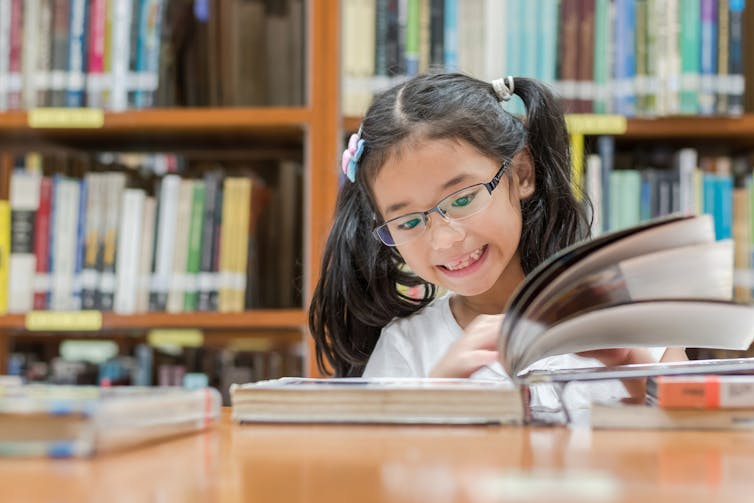If children are built, in part, by the books they’re raised on, then I was all Roald Dahl. From my small bedroom in suburban Essex, his stories allowed me to try on new and distinctly more exciting lives for size.
There was James aboard his giant peach, George with his marvellous granny vanquishing medicine and of course, Charlie, who wins a trip to a chocolate factory and a lifetime’s supply of sweets — for the grandchild of a dentist, an impossible dream.
And Dahl was my dream maker, a fairy godfather, a living wizard. So much so that when I, the adoring fan, eventually met him at a Puffin Club convention I was rendered mute under his spell.
His books represented escape from the humdrum of the everyday that I recognised even aged seven. And more than that, they were an education. I learned new words as well as important lessons. Enemies can be bested, no matter how much bigger they are, grown-ups aren’t always right and reading books is, in itself, a kind of magic.
However, looking back through a more forensic lens, there were other, less edifying ideas I picked up as well.
From The Twits, I learned that the “African language” that the Muggle-Wump monkeys spoke was “weird”. From Charlie and the Chocolate Factory I learned that being “enormously fat” was a character flaw, on a par with selfishness. From The Witches, I learned that being bald, as a woman, meant you were probably evil and definitely ugly. Daft, obviously, but still it lingered in my 30s when to my abject horror, I developed alopecia.
Making amends
So, I was invested in the argument when, in February 2023, it was revealed that Dahl’s publishers, Puffin, have made some tweaks for the latest print runs. There has been an outcry, with everyone from author Salman Rushdie to UK prime minister Rishi Sunak weighing in to condemn this “censorship”, as if Puffin were burning or banning books.
The fact that this was done in discussion with Dahl’s estate cannot assuage them, nor that these small changes are the kind made every day to books either pre-publication or before a new print run.
Read more: In the far from diverse publishing industry, sensitivity readers are vital
And the changes are small. That language is no longer “weird”, just “African”. Augustus Gloop is no longer “enormously fat”, just “enormous”. Mrs Twit is no longer “beastly and ugly”, just “beastly”. A witch posing as a woman is no longer likely to be a “cashier in a supermarket or typing letters for a businessman” but may be a “top scientist or running a business”.
The stories and Dahl’s voice with his energetic, inventive turns of phrase, remain intact. A win, surely? Or is it? Because, while the language might be superficially “fixed”, the books still contain problematic themes and character traits.
Baldness in women is still linked to badness. Being “enormous” is still a character flaw. And this is before we begin to unpack the Oompa-Loompas, albeit in their new gender neutral guise.
When we read, we learn what it might be like to be someone other than our self. We find common ground as well as differences. In other words, we learn empathy. But through Dahl, the spectrum of those with whom we’re invited to empathise or even to recognise as “like me” is fairly narrow, while too many others are sidelined as bad in their difference, potentially leading readers to reject them off the page as well.
So what is the answer to this and other “difficult” texts? (Dahl, of course, isn’t the only author to have equated ugliness or disability with villainy, nor to display chronic fatphobia.)
As an expert in creative writing, my preference would be to let them quietly fall out of print. No “censorship”, but no reruns either. Don’t give them a brand new foil wrapper that suggests the contents are fresh and 21st century. That implies a currency, a relevance, a truth.

Instead let them sit on the shelves of parents and grandparents (who are the real Dahl fans now, children have far wider taste) and be seen, with their cracked covers and dog-eared pages, for what they are – things of the past, to be appreciated as such.
It’s not as if, without Dahl, there will be a void with no funny books, no magic books, no books about giants to fill it. Bookshops don’t have enough shelves for the myriad new releases. The Lollies Prize celebrates brilliantly funny new books for children every year. Empathy Lab curates an annual collection of around 50 new books that don’t skimp on stakes or adventure or menace, but also work to nurture inclusivity.
I was a child of Dahl and am indebted to him for nurturing my love of words. But I’m glad my own daughter showed scant interest, for there are more stories out there, and better ones, to shape her generation and the next.
Jo Nadin is a member of the Society of Authors (SOA) and the Authors Licensing and Collecting Society (ALCS). Her book, No Man's Land, is part of the Empathy Lab collection. Her book, The Worst Class in the World Gets Worse, is shortlisted for the Lollies Prize.
This article was originally published on The Conversation. Read the original article.







